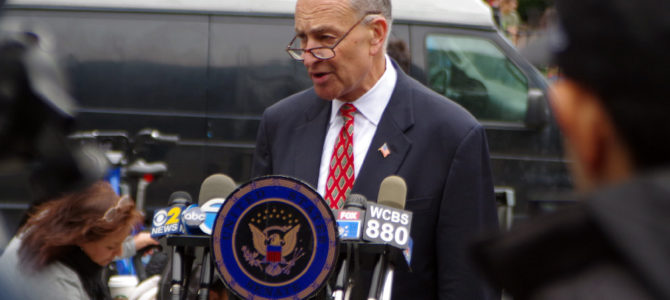
Leaders in both parties engaged in rhetorical bluster over the weekend regarding Obamacare’s cost-sharing reductions. Those payments to insurers for lowering deductibles and co-payments—ruled unconstitutional by a federal district court judge last May—remain in political limbo, and a subject of no small controversy.
But the rhetorical exchanges yielded inconvenient truths, both for Democratic leaders demanding the Trump administration continue the payments, and for the president himself, who has threatened to stop them.
Schumer: If the Payments Are Constitutional, Trump Can’t Withhold Them
Senate Majority Leader Schumer tweeted about what might happen “if @POTUS refuses to make CSR [cost-sharing reduction] payments.” There’s just one problem with his statement: If the payments are lawful, President Trump cannot refuse to make them. More than four decades ago, the Supreme Court held unanimously in Train v. City of New York that the Nixon administration could not spend smaller amounts than what Congress appropriated for a environment program.
Schumer therefore implicitly admitted—as elsewhere—that the payments are not only illegal, but unconstitutional. Obamacare lacks an explicit appropriation for the cost-sharing reduction payments. That’s the reason Judge Rosemary Collyer ruled the Obama administration’s actions in making said payments unconstitutional last year. (The ruling is currently stayed pending appeals.)
As one summary of the case noted, Train v. City of New York established the principle that “the President cannot frustrate the will of Congress by killing a program through impoundment.” Yet Schumer, in asking the Trump administration to continue making payments to a program that Congress never funded in the first place, wants the executive unilaterally—and unconstitutionally—to frustrate the expressed will of the legislative branch, thereby diminishing Schumer’s own authority as a lawmaker.
It’s highly likely Schumer, a lawyer who spent several years serving on both the House and Senate judiciary committees, knows full well the nature of unconstitutional actions, begun by the last administration, that he wants the current one to continue. But if he wants to have any credibility on the rule of law—whether criticizing the Trump administration’s other “abuses,” or standing up for the independence of the Russia investigation—he would be wise to 1) admit that the Obama administration violated the Constitution in making the payments to begin with and 2) hold the last administration just as accountable as he wants to hold the current president.
Trump: Upholding the Constitution Is a Choice
Conversely, the president seems to delight in dangling in front of Democrats the prospect of cancelling the CSR payments, as he did most recently on Twitter Saturday, one day after the Senate failed to approve a “skinny” health-care repeal.
But for the president, as for Schumer, the question of the cost-sharing reduction payments should come down to a binary choice: Does a lawful appropriation for CSRs exist, or not? If a lawful appropriation exists, then the president must make the payments, consistent with Train v. City of New York outlined above. If a lawful appropriation does not exist, then the president must not make the payments, consistent with both Article 1, Section 9, Clause 7 of the Constitution—“No Money shall be drawn from the Treasury, but in Consequence of Appropriations made by Law”—his duty to “take Care that the laws be faithfully executed,” and his oath of office.
This conservative believes President Trump should have cancelled the CSR payments within days of taking office, not because it would have been popular—it likely would not have been—but because the rule of law demands it. Likewise, President Trump should have long since undone billions of dollars in reinsurance payments to insurers that the Government Accountability Office found illegal, and cancelled the “grandmothered” plans President Obama allowed some individuals to keep in 2014—violating his constitutional duty to “take Care that the laws be fully executed” in the process.
Making a clean break with the numerous legal and constitutional violations the Obama administration perpetrated to keep Obamacare afloat early in his administration would have demonstrated President Trump’s desire to escape the executive unilateralism of his predecessor.
Government of Laws, Or of Men?
In drafting the Constitution for the Commonwealth of Massachusetts, John Adams famously spoke of creating a government of laws, not of men. Yet both participants in the CSR drama this weekend seem insistent on creating an arbitrary government based on whim. In Schumer’s case, that whim stems from placing Obamacare on a higher pedestal than the Constitution, while the president’s whims seem most directed towards achieving a legislative victory on health care, no matter its form.
That Barack Obama, a constitutional law professor, bequeathed such legal gamesmanship and a culture of inherently arbitrary actions to both parties stands as one element of his legacy. As the debate this weekend demonstrated, that legacy has affected—and infected—our constitutional discourse, and not for the better.









